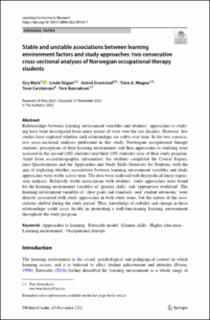Stable and unstable associations between learning environment factors and study approaches: two consecutive cross-sectional analyses of Norwegian occupational therapy students
Peer reviewed, Journal article
Published version
Permanent lenke
https://hdl.handle.net/11250/3049373Utgivelsesdato
2022Metadata
Vis full innførselSamlinger
Originalversjon
10.1007/s10984-022-09445-7Sammendrag
Relationships between learning environment variables and students' approaches to studying have been investigated from many points of view over the last decades. However, few studies have explored whether such relationships are stable over time. In the two consecutive cross-sectional analyses performed in this study, Norwegian occupational therapy students' perceptions of their learning environment and their approaches to studying were assessed in the second (162 students) and third (193 students) year of their study program. Aside from sociodemographic information, the students completed the Course Experience Questionnaire and the Approaches and Study Skills Inventory for Students, with the aim of exploring whether associations between learning environment variables and study approaches were stable across time. The data were analyzed with hierarchical linear regression analyses. Relatively stable associations with students' study approaches were found for the learning environment variables of 'generic skills' and 'appropriate workload'. The learning environment variables of 'clear goals and standards' and 'student autonomy' were directly associated with study approaches in both study years, but the nature of the associations shifted during the study period. Thus, knowledge of stability and change in these relationships could assist faculty in promoting a well-functioning learning environment throughout the study program

